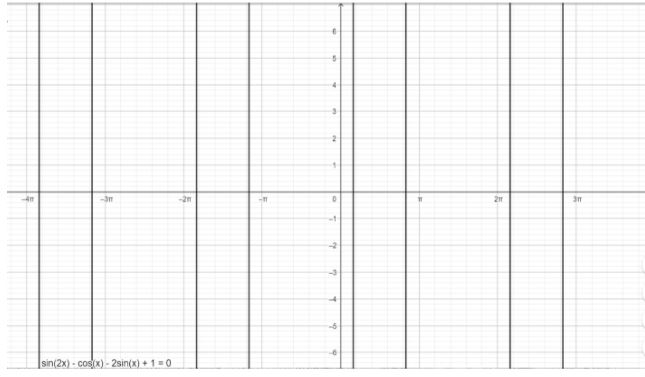Question
Question: How do you solve \(\sin 2x-\cos x-2\sin x+1=0\)?...
How do you solve sin2x−cosx−2sinx+1=0?
Solution
In the question we have the multiple angle which is sin2x. So, we will apply the known formula sin2x=2sinxcosx in the given equation. Now we will take cosx as common from the terms 2sinxcosx, cosx and simplify the obtained equation. Again, we will observe the terms in the obtained equation and simplify the equation and equate the terms in the equation to the zero. Now we will get two equations, from these equations we will solve each one by considering the trigonometric values of different ratios. Now we will get the required solution.
Complete step-by-step answer:
Given that sin2x−cosx−2sinx+1=0.
We have the trigonometric formula sin2x=2sinxcosx. Substituting this value in the given equation, then we will get
sin2x−cosx−2sinx+1=0⇒2sinxcosx−cosx−2sinx+1=0
Taking cosx common from the terms 2sinxcosx, cosx in the above equation, then we will get
⇒cosx(2sinx−1)−2sinx+1=0
Taking −1 common from the terms 2sinx, 1 in the above equation, then we will get
⇒cosx(2sinx−1)−1(2sinx−1)=0
Again taking 2sinx−1 common from the above equation, then we will get
⇒(2sinx−1)(cosx−1)=0
Equating each term individually to the zero, then we will have
2sinx−1=0 or cosx−1=0.
Simplifying the above equations then we will get
2sinx−1=0⇒2sinx=1⇒sinx=21 or cosx−1=0⇒cosx=1
We have sin(6π)=21 and cosπ=1, then the solutions of above equations are
x=nπ+(−)n6π or x=2kπ where n,k∈Z.
Note: We can also plot a graph of the given equation with is given below

From this graph also we can find the solution of the given equation by observing the points where the given equation meets the x−axis. The points where the given equation meets the x−axis are the solutions for the given equation.
